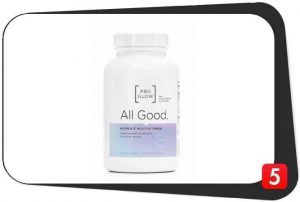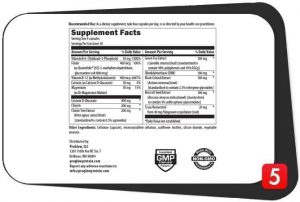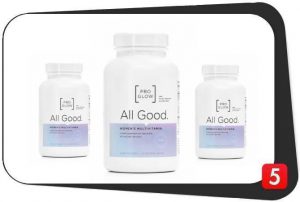
When it comes to multivitamins, it’s hard to stand out in a crowded market.
Which is why certain brands have eschewed the one-size-fits-all approach and have chosen instead to target specific aspects of health and wellbeing.
Newly released All Good by ProGlow is one such multivitamin, focused primarily on helping to regulate healthy female hormone levels, addressing issues caused by PMS and menopause.
But does it work? Here’s our review of ProGlow All Good, examining each ingredient and evaluating its health claims.
Table of Contents
About ProGlow All Good
ProGlow was created by former competitive figure skater and track athlete, Dr Pauline Haugen, with the goal of creating ‘pure’ pharmaceutical-grade supplements aimed at women.
It’s a relatively new company, formed in 2018, and offers collagen supplements, protein shakes, an amino acid complex and more – selling eight supplements in total, all female-focused.
ProGlow All Good is a new product, described as a woman’s multivitamin. It contains five vitamins and minerals known to support cell health and help prevent folate deficiency.
Of course, compared to other multivitamins on the market, this is considerably fewer nutrients than competitors – but that’s not all All Good is about.
Unlike your average multivitamin, ProGlow All Good has a few tricks up its sleeve.
It contains a range of intriguing, natural extracts and valuable molecules that can help regulate the hormonal system, helping to address ‘physical discomfort and mood changes associated with PMS and menopause.’
This supplement therefore claims to help support your liver, hormonal and immune health. But is this claim too good to be true?
All Good Supplement Facts
Other ingredients: Cellulose, microcrystalline cellulose, sunflower lecithin, silicon dioxide, vegetable strearate
Directions for Use
One serving is four capsules taken per day. The manufacturer does not recommend taking these at any specific time of day, so presumably you can take them at any time.
According to the official ProGlow website, however, it’s better to not take this supplement with food.
This is probably to increase its rate of absorption. To be honest, you can take this supplement either with or without a meal – it shouldn’t make a noticeable difference in effects!
All Good Ingredients
Magnesium
No multivitamin is complete without magnesium. It’s used by hundreds of chemical processes inside the body and is a vital part of staying healthy (and alive).
Women should aim to be getting at least 270mg daily and yet around 50% of people worldwide get less than magnesium than they need.
ProGlow All Good provides just 50mg per serving, which is a bit lower than we’d expect. Magnesium may also prevent migraine headaches and lessen their severity.
Calcium
Calcium. It’s another micronutrient that’s essential to cell health. Calcium is especially important for maintaining bone structure and may prevent bone loss in older females – it’s included in pretty much all multivitamins.
The 450mcg of calcium in All Glow is just below the recommended daily amount of 500mcg, but you’re probably already taking in enough of it through your diet alone.
Vitamin B12
Vitamin B12 and folate are two names for the same thing. ProGlow has sneakily listed these are two separate ingredients despite them being identical!
This is probably because All Good uses folate and vitamin B12 from two different molecules, but in reality, there’s no noticeable difference between the two.
Vitamin B12 is arguably the most important female support supplement, not just for pregnant women.
It helps prevent megaloblastic anemia and helps to keep cells healthy.
Most companies use synthetic folic acid in their supplement, but ProGlow uses folates from 100% natural sources.
That’s the vitamins and minerals covered, now onto the exciting stuff! ProGlow All Good contains seven additional extracts and molecules, all of which we’ve taken a closer look at below.
Chaste Tea Extract
Don’t worry if you’ve never come across chaste tea extract before, we hadn’t either!
It’s a supplement extracted from chasteberries, a peppery tasting berry with a long history of use in central Asia.
It contains agnusides which are used to relieve menopausal symptoms as well as menstrual problems and infertility.
Research into the benefits of chaste tea extract is generally inconclusive, but it is effective at relieving symptoms of premenstrual syndrome (PMS) so it has a rightful place in this supplement.
Diindolylmethane
Diindolylmethane (DIM) might sound like a complex, synthetic chemical that’s been created in a lab but it’s actually a natural indole molecule that’s abundant in leafy greens, kale and Brussel sprouts.
This is a powerful supplement that’s occasionally prescribed by physicians (as Indolplex) to promote healthy estrogen metabolism.
At low doses, like in ProGlow All Good, DIM is still considered a dietary supplement and not a drug.
DIM interacts with estrogen receptors in the body, aiding estrogen metabolism. This means that DIM promotes healthy cell development.
Trans Resveratrol
Trans resveratrol is a type of phenol (plant molecule) that’s released by certain plants when they come under attack from bacteria and pathogens.
In clinical studies it has shown, like many phenols, to exhibit anti-inflammatory and anti-carcinogenic properties.
That’s all well and good but does it deserve its place in this hormone-regulating multivitamin? Yes.
Studies show that resveratrol may be a useful supplement for post-menopausal women to protect both their cognitive performance and mood.
It may also offer them cardio- and osteoporosis protection. The benefits for younger women are thought to be limited.
Trans resveratrol can also reduce symptoms of polycystic ovary syndrome (PCOS). It does this by lowering testosterone levels.
In one study, women given 1,500mg of Trans resveratrol daily lowered their testosterone levels by 23%, helping them manage their PCOS.
We haven’t been able to find out where ProGlow sources their Trans resveratrol from, but it’s usually extracted from red grapes or Japanese knotweed.
Green Tea Extract
Green tea has been used for its health benefits for thousands of years. It’s packed full of antioxidants and can reduce the risk of developing some cancers.
There’s a difference between whole green tea and green tea extract; the latter only contains useful ingredients and no water or plant fiber.
Green tea extract contains polyphenols and EGCg which promotes weight loss.
Its inclusion in All Good is likely because green tea has been shown to alter the estrogen metabolism of post-menopausal women (premenopausal women seem unaffected), reducing estrogen levels which may also reduce the risk of breast cancer.
Broccoli Seed Extract
The broccoli seed extract used in this product is a rich source of sulforaphane, a potent supplement that’s increasingly being studied.
It’s an anti-inflammatory and taking it ‘may help to prevent or treat breast cancer by reversing estrogen-induced metabolic changes’.
Be warned though, taking too much broccoli seed extract often causes digestive discomfort and increased gas.
Chrysin
Chrysin is believed to affect testosterone levels, so it could improve menstrual health and fertility. However, there’s no evidence to back this up – it’s the weakest ingredient in All Glow by far.
Black Cohosh Extract
A more powerful inclusion in this product is Black Cohosh extract, an herb in the buttercup family.
It has been included in women’s supplements since the 1950s and is commonly used to reduce peri- and menopausal symptoms such as hot flashes, mood swings and excessive sweating among others, as well as help to tackle bone density loss in postmenopausal women.
Although many women swear by its effects, most of the molecules that make up Black Cohosh extract don’t actually do anything, at least not scientifically.
Note too that any studies demonstrating benefits concluded that they only lasted for six months to one year, which is why it is not recommended for long-term use.
It has also been linked to liver problems, which is still being studied.
There is no standard dose of Black Cohosh, but the British Herbal Compendium recommends taking between 40-200mg (in dried herb form) so the dosage in All Good should be effective.
ProGlow All Good Formula Analysis
This is an interesting multivitamin supplement with an unusual selection of ingredients.
You probably won’t have come across many of the extracts included in ProGlow All Good before, but they’ve clearly been chosen carefully with a specific focus in mind.
That focus seems to be primarily on helping women cope with PMS and menopause symptoms, a noble intention.
It could be useful for both, though older women may benefit more as research suggests some of the ingredients are ineffective on pre-menopausal women.
There’s an issue with ProGlow All Good: it claims to support your liver, hormonal and immune health.
But how can it actively support liver health when at least one of its ingredients (Black Cohosh) can potentially damage the liver?
Green tea too can cause liver damage if abused. ProGlow would have been better leaving that claim off the label.
We do agree, however, that All Good can potentially support hormone levels and immune health.
Ingredients like Diindolylmethane can change hormone levels while Black Cohosh extract could strengthen the immune system.
One other problem we need to address right away is the lack of vitamins and minerals. ProGlow All Good contains just four vitamins/ minerals (or five if you include folate), while women’s multivitamins usually contain many more.
Our favorite multivitamin, Whole Food Multi for Women from Performance Lab, contains 28 vitamins and minerals, with at least 17 of these meeting 100% or more of RDA.
That leaves All Good looking a little lacking, doesn’t it? It might be more honest to describe this product as a hormone support aid, as opposed to a multivitamin.
If it were a more encompassing multivitamin, for instance, it would be nice to see vitamin D included, as it helps keep bones strong and may prevent osteomalacia which is common in older women.
It’s also surprising not to see any iron in the formula, given All Good’s emphasis on tackling PMS symptoms.
Iron is particularly important (not to mention a common deficiency) for menstruating women to prevent anemia.
Of course, postmenopausal women do not require as much iron, and this highlights another issue that we can see with this product – the needs of pre-, peri- and post-menopausal women are very different.
By very definition, their hormonal metabolism differs by age and circumstance, and attempting to provide one product that tackles the very different symptoms of PMS and menopause is perhaps a step too ambitious.
All Good Benefits
As well as providing a daily dose of certain vitamins, this product gives you a range of effective, natural extracts, most of which are backed by research.
Taking ProGlow All Good daily may create a noticeable improvement in your physical health, especially if you have a hormonal imbalance.
Who Takes It?
Menopausal women would especially benefit from taking this supplement. Some of the ingredients, like Trans resveratrol, can directly adjust hormonal imbalances and may improve symptoms of the menopause.
Others, such as green tea extract, have been shown to affect post-menopausal women rather than pre-menopausal.
Who shouldn’t Take it?
Pregnant or lactating women should not take this multivitamin without first contacting their physician.
Some of the ingredients haven’t been tested during pregnancy or lactation.
Diindolylmethane may harm an unborn baby and be passed on through lactation, there’s currently not enough research into its safety.
All Good could potentially interfere with some prescription and over-the-counter medications, thanks to the Black Cohosh.
Women suffering from liver problems or estrogen-related cancers should also consult their physician before taking ProGlow All Good.
Any Potential Side Effects with All Good?
The broccoli extract in All Good may cause some digestive discomfort, while the liver issues potentially caused by Black Cohosh are something to think carefully about.
Ditto its ability to interfere with some medications.
As ProGlow All Good is completely new to the market, we can’t comment with certainty on what side effects, if any, are likely to occur.
Pricing & Where to Buy
A bottle of 120 capsules retails for $59.99. This works out at just under 50 cents per capsule which is significantly more expensive than your standard multivitamins.
Even top end multivitamins such as Performance Lab Whole-Food Multi only cost $40 for 120 servings. Bear in mind too that at four capsules per serving, a bottle of ProGlow All Good will only last for one month.
The high price tag can be explained by the ingredients.
Although vitamins are fairly inexpensive to produce, other ingredients, like Black Cohosh extract, are more expensive due to their rarity.
This multivitamin is hard to find at the moment as it’s a new supplement, launched earlier this year.
Getting your hands on a jar is currently quite difficult. No major stores currently stock it, but it can be bought online through BodyBuilding.com and can also be bought directly from ProGlow Protein.
Want to see the best multivitamins?
Click here now
All Good Summary
Pros:
- Contains a unique selection of powerful plant extracts
- Is free from artificial colorants, additives and preservatives
- Contains folate and magnesium, essential multivitamin ingredients
- Supports women’s hormone health using scientifically-backed ingredients
- May well help to ease PMS and menopausal symptoms
- Suitable for vegetarians but not for vegans
Cons:
- Costs more than we believe it’s worth
- Has not been FDA-approved (yet)
- Doesn’t contain that many minerals or vitamins
- You will need to take all four capsules in order to benefit from effective dosages
ProGlow All Good Final Review
ProGlow All Good is a decent specialist supplement for hormone support, with a clean label and carefully chosen ingredients.
We like that it has a vision for tackling this element of a woman’s health, even if we think it tries to do a little too much by tackling PMS and menopause together.
By trying to cram in support for both in one capsule, it probably means younger women are consuming ingredients they don’t actually need, while older women are doing the same.
Nevertheless, the latter group especially will probably appreciate having non-medicinal options out there as they cope with the often-debilitating symptoms menopause can bring.
All Good calls itself a women’s multivitamin, however, and that’s how we must judge it, and it’s here where it falls down.
We’re not convinced it contains enough vitamins and minerals to be describing itself as a women’s multivitamin.
It’s not breaking any rules, it just doesn’t seem to be in the right spirit. If you bought this product as a multivitamin alone, for instance, you might well be disappointed.
There’s a nice selection of ingredients but not enough minerals and vitamins to compete with the best on the market (or even mid-market multivitamins).
Buy it for hormone support if you wish, but if you’re looking for a strong women’s multivitamin, there are much better options out there.
[yasr_overall_rating]


Leave a Reply